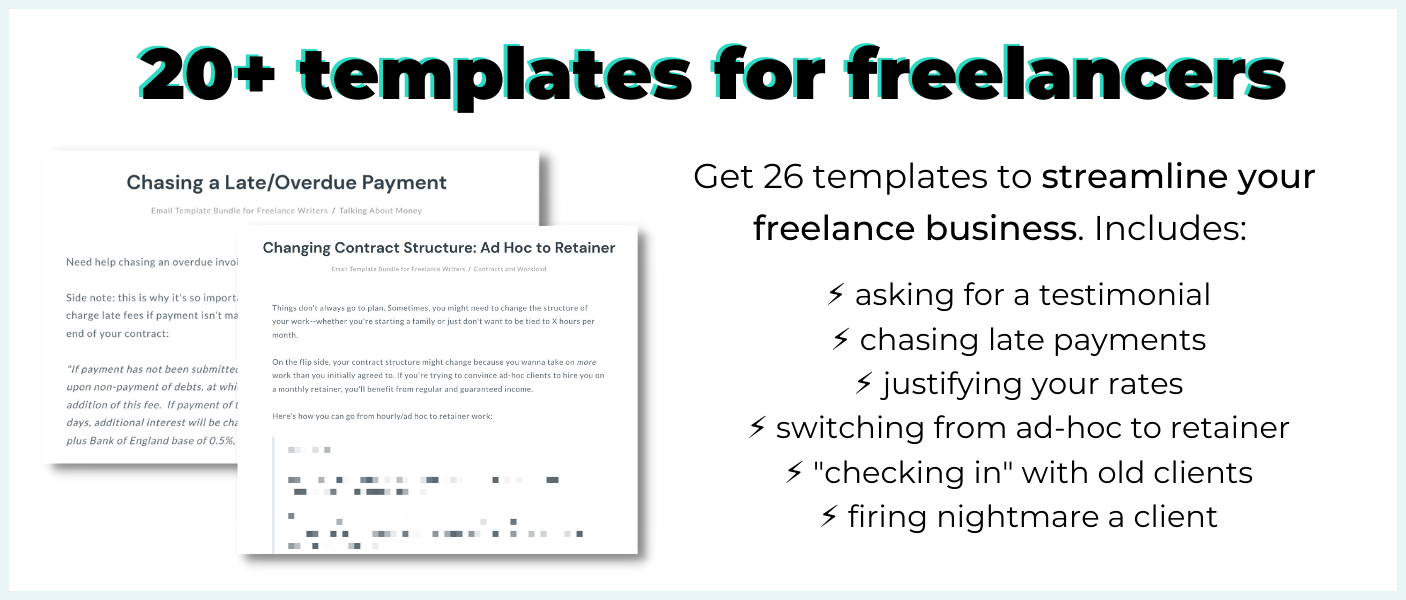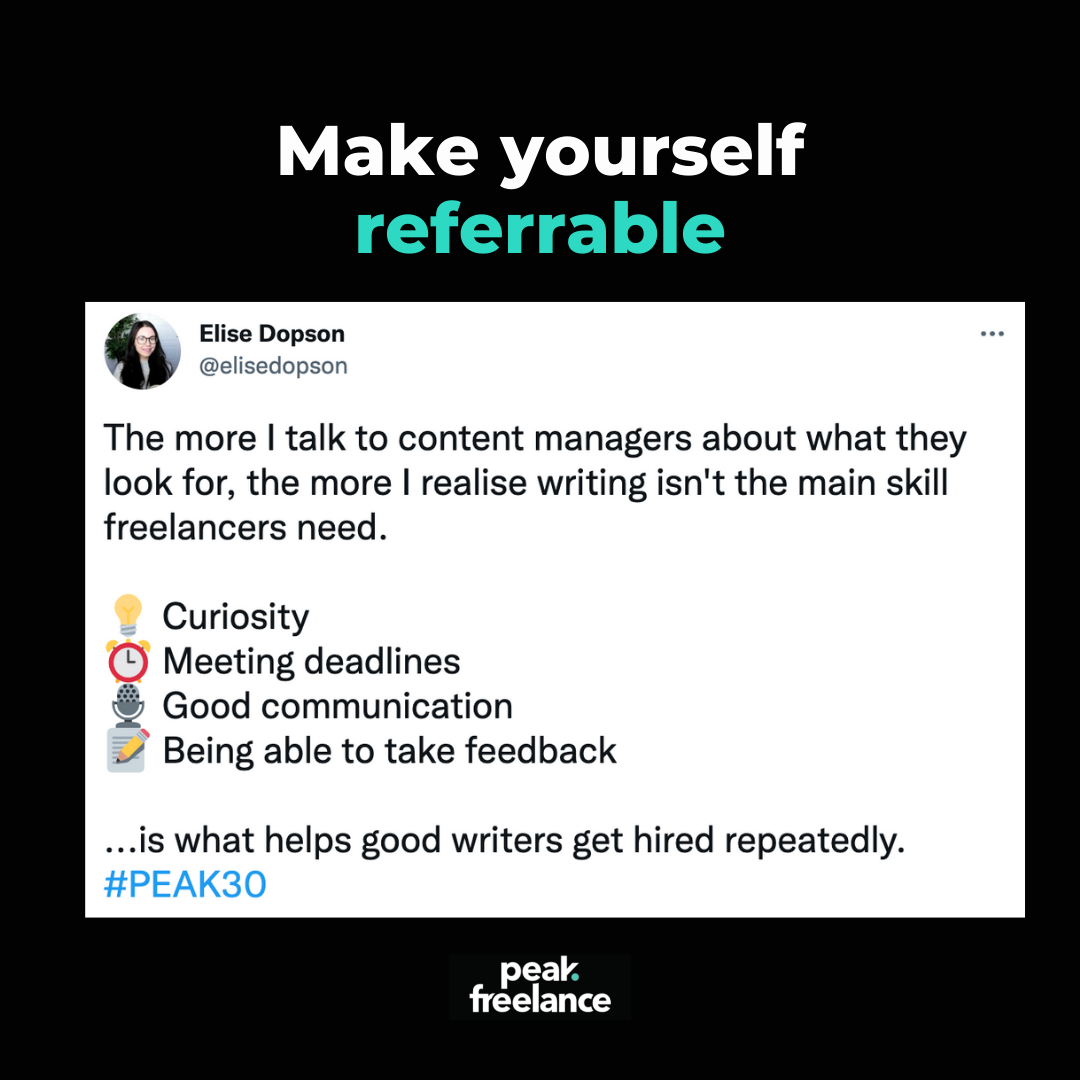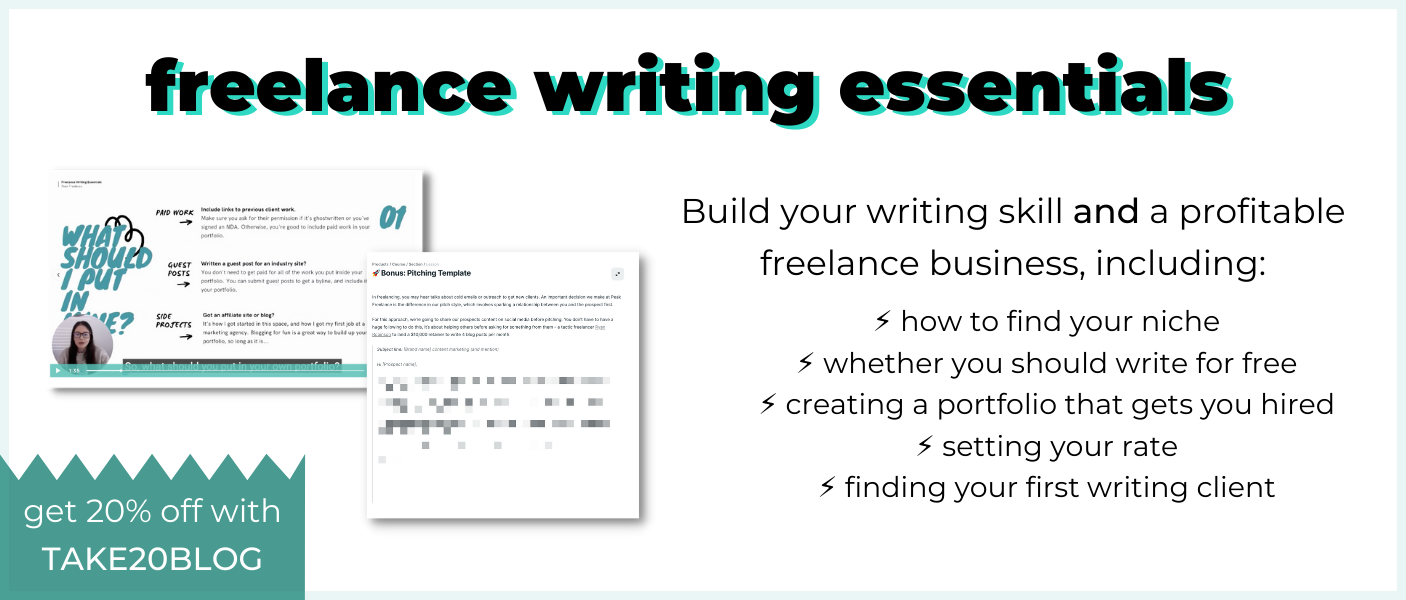Considering a full-time career as a writer? Then you’re probably wondering what freelance writing skills you’ll need to survive other than the most obvious: writing.
We spoke with freelance writers and content specialists to identify the skill set you should learn to build a freelance writing business.
Top 9 freelance writing skills to develop
- Networking
- SEO
- Proofreading
- Time management
- Communication
- Blogging
- Organization
- Storytelling
- Research
Disclaimer: Some of the links below are affiliate links. We may earn a commission if you buy something through our link at no extra cost to you. This helps keep our articles free of charge. Please know that we only recommend products and services we’ve personally used and support.
1. Networking
A recent Twitter poll revealed that networking is the most important skill to have as a freelance writer. Some 45% of people surveyed felt that networking has made the biggest impact on their careers and helped them find freelance writing jobs.
Rebecca Reynoso, Senior Editor at G2 and part-time freelance writer, states “Networking hands down [is the most important skill]. Of all the clients I have worked with, not one have I pitched or sought out myself.”
Rebecca adds, “Every former, current, or potential client I’ve had has been via networking (being recommended by someone else) + a strong social media presence (“advertising” myself).”
Networking skills are the ability to maintain professional and social contacts. Many freelancers build their online presence and connect with others through LinkedIn or Twitter.
As a freelance business owner, it’s a critical skill to develop relationships, promote your freelance business, and get more writing work. That way, you don’t need to rely on freelance writing content mills like Upwork to land freelance writing gigs.
2. SEO
Clients will look for writers that can get results for their work. One way to show this is through ranking articles in search engines like Google, a skill known as Search Engine Optimization (SEO). When your article ranks high, like in position one or two, your client will get more traffic and leads to their website, which can impact their bottom line.
Learning SEO makes writers a more strategic asset to clients. It helps them create relevant, high-quality content that answers a searcher’s query. This results in higher rankings for an article, which can drive traffic and leads to a clients website.
Bernard Huang, co-founder of Clearscope
Understanding SEO can bring new streams of revenue into your freelance business. SEO consulting and workshops are excellent ways to earn extra money and expand your offering.
Learning SEO writing doesn’t happen overnight, the topic is pretty dense. But you can start with a few of the resources below:
- 📝 A Beginner’s Guide to SEO by Ahrefs
- 📝 The Beginner’s Guide to SEO by Moz
- 📝 Search Engine Optimization Start Guide by Google
- 🖥 SEO For The Rest of Us
- 📚 Doing Content Right by Steph Smith
3. Proofreading
Proofreading involves examining text to find and correct typos and mistakes in grammar, style, and spelling. Whether you’re writing an article, research report, press release, email, or ad copy, mistakes can change the meaning of what is written. Major ones can cost your client money, and it diminishes their reputation as a business.
When working in a freelance writing niche, it’s important for your work to be free of grammatical errors–hence why you should learn how to proofread your text.
Use a free freelance writing tool like ProWritingAid to quickly brush up your work before sending it to clients. It shows how clear and engaging your writing is, even swapping complicated words for those that make your writing easier to read. Think of it as your own personal style guide that keeps writing consistent and thorough.
4. Time management
Managing time well can greatly benefit your freelance writing career. Organizing your days helps you complete work on time, stay engaged during client meetings, and give you space to explore your creativity and be proactive. Strong time management skills lead to accomplishing goals easier and advancing your small business.
For example, if your goal is to complete an article, you need time to research sources, prepare for interviews, write an outline, and complete a draft. Setting aside specific amounts of time per day can help you complete the necessary tasks to finish an article.
Need help managing your freelance time? Try a free time tracking tool like Clockify. Once you know how long tasks take you, you can start to build a working schedule around it. If you find that researching takes one hour but a blog post takes five, for example, you could realistically fit one of each task into your working day–without feeling like you’re behind.
Time management, being reliable, and sticking to deadlines is one of the most underrated freelance writing skills. Seriously, the amount of freelancers I’ve worked with at this level that still go missing in action while having blog posts assigned to them is worrying. I respect things come up in peoples lives, and mine too of course, but just let the content manager know so we can move things around.
Adam Rogers, Senior Content Marketing Manager at Shopify
5. Communication
Freelance content writing is a highly remote industry, meaning most self-employed writers don’t work in an office. A lot of client communication is done faceless: assigned tasks through a project management software, edits in Google Docs, chat in apps like Slack or Microsoft Teams, invoicing through freelance accounting software.
To nurture these relationships and succeed in working from home, you’ll need good communication skills.

6. Blogging
We all know that anyone can technically write a blog post. But the truth is: most online content is crap. It’s hard to read. It’s full of filler words. And it doesn’t really teach you anything — it’s just words on a digital page.
That’s why to become a successful freelance writer, you want incredible blogging skills. “Good blogging skills goes beyond being a good writer,” explains software writer Alex B Boswell. “You need to format content so it’s easy to read, include expert insights to make it credible, know basic graphic design to create images, and add strategic call-to-action’s that encourage conversions.”
The best, highest-paid writers know blogging inside out. They can turn a keyword into an engaging piece of content, and write something people actually enjoy reading.
To improve your blogging skills:
- Take feedback from your writing clients. Feedback might be scary, but the content manager or editor is there to take your blog post the extra mile.
- Start a side project. Start a WordPress website with WPEngine and grab a domain from Studiopress. Start writing about a topic you enjoy outside of your niche. Refine your blogging skills and strategy to learn what ranks (and doesn’t) without risking your client’s website. Talk about making a great case study for yourself!
- Guest post. Write content for different company websites (for free) and learn different blogging and writing styles. You’ll learn some new tricks, plus get a byline and drive traffic to your own freelance website.
7. Organization
Being organized is one of the most important skills you can have as a freelance blogger or writer. Organizational skills help you meet deadlines, lower stress, and carry out tasks more efficiently. This freelance writing skill takes many different forms, but normally involves keeping your workplace neat, completing tasks, and managing research.
“The internet is a treasure trove of free resources and inspiration, but you don’t always come across them when you need,” explains freelance content writer Jul Domingo. “You’ll want to sort your findings using a tool like Evernote, or even bookmarking websites in Google Chrome. This way you always know where to find your sources.”
Organized writers are typically more motivated because they can work on assignments with less stress.

Being organized also leaves you with more time and energy to make sure articles are written well. You’ll also keep a more goal-oriented mindset, so you can plan strategically and offer more competitive writing services.
For example, if you’re disorganized, you may end up missing a client email and losing the contract. You also may make silly grammar mistakes because you’re rushing and worried about jumping to the next article.
To improve your organizational skills:
- Make lists. Keep record of everything you have to complete with status updates. This can be a physical list or digital list in a tool like Asana. Checking off complete assignments will help you stay on-task and focused.
- Keep a schedule. Set a regular schedule for yourself. If you like to work early in the morning, plan your writing hours during them. Then catch up on emails in the afternoon. Creating a detailed schedule of your day helps budget the time and resources needed to meet your deadlines.
😥 Need help with client management? See 9 of the best CRMs for freelancers.
8. Storytelling
Science says if you want people to respond, tell a good story. Professional writers are storytellers at heart, turning ideas into compelling stories that people want to read.
Even in content writing and copywriting, great storytelling can take readers to new and unexpected places, helping them understand unfamiliar concepts and perspectives.
As when you’re writing online for money, it also helps you earn more. “It wasn’t until I improved my skills as a journalist, storyteller, and strategist when my freelance business soared, explains B2B SaaS writer Saphia Lanier.
“This was key to attracting and retaining higher-paying (and overall better) clients from brands I admired. And reaching my goals to become not just another six-figure freelancer, but one with a great work-life balance.”
Even if you are brand new, create writing samples that showcase your storytelling skills. Some prospective clients won’t worry about subject matter expertise if they know you can tell a story and communicate information clearly. Place them on your freelance writing website to use as a portfolio when clients ask for samples.
9. Research
A big part of becoming a freelance writer is the research you put into an article. Some new clients will give you a detailed brief, and others will provide a simple keyword and description.
As a writer, you want to pull as much information and relevant insights to create content that people want to read. “Being able to roll up one’s sleeves and just dig deep for relevant information works wonders,” explains freelance writer, Afoma Umesi.
“Something I also think helps me a ton is putting myself in the reader’s shoes. If I can imagine my target audience, my article is sharper. Ultimately, this means reading more online content like white papers and seeing what they’re doing wrong vs doing right.”
Here are a few practices to help hone your research skills:
- Start broad, then go into the specifics. Research is a huge task. It can be hard to know where to start. Online resources like Google and Wikipedia can give you a basic understanding of a topic with key points. Once you have a general idea, you can go into more detailed observations like research reports and surveys.
- Identify quality sources. Not every report you find on the internet will be trustworthy. You need to know the difference between authoritative sources and crappy ones. When researching, ask yourself, does the author have a reputable background? Does this information correlate with what I’ve already found?
Some reputable sources include:
- The Information (get 14 days free)
- Marketing Charts
- Statista
- McKinsey
- Deloitte
- Forrester
- eMarketer
- Have a list of questions ready. Good research starts with your questions about a topic, not verifying what you know. Keep an open mind when researching. It’ll allow for surprise findings and help you go deeper into a topic.
Build your freelancing skills today
You might be looking at the list above and thinking it’s a bit overwhelming. Don’t sweat it! We’ve all been there. You can learn all of these writing and marketing skills through dedicated training and education, and practicing your freelance work. It doesn’t matter what type of writing you do.


